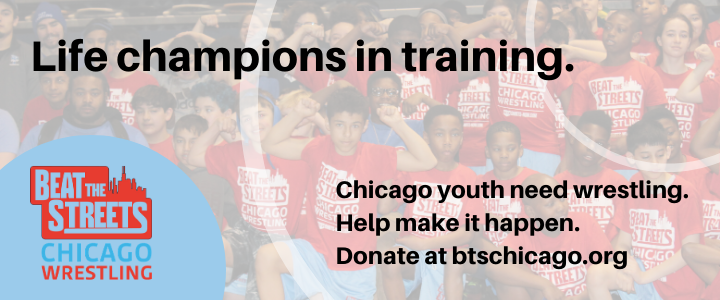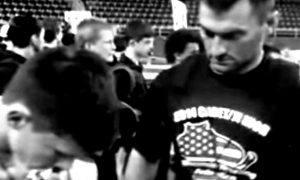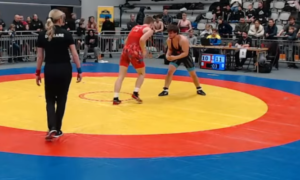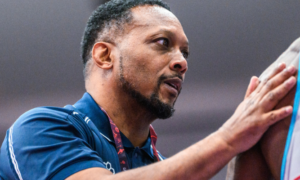Sometimes it takes purposeful effort to keep up with Carter Nielsen (87 kg, Minnesota Storm). Especially on this night, because the 23-year-old is bubbling with energy.
Nielsen is talking about his new gig as a real estate broker, and how he was motivated to seek a potentially lucrative occupation that could capitalize on his personable nature and still offer enough time to train. That he hooked up with a highly-reputable firm right out of the gate also has him in positive spirits. “I’m actually with one of the most well-known brokerages in all of Minnesota,” Nielsen says proudly. “I think I’m going to do just fine. I think I’m going to do great with all of the guys I have to mentor me right now.”
Confidence has never been an issue for Nielsen with regards to wrestling. Why should selling houses be any different?
Shortly after arriving at Northern Michigan University nearly three years ago following a stint at Division I North Dakota State, he made headlines by declaring his intention to make both the 2018 U23 and Senior US World Teams despite a lack of top-level Greco experience. Words that to some read as precocious and premature Nielsen defended by questioning why a competitor would ever think differently. “If I were to go to Senior Trials without thinking I am going to win, then why would I go?” he asked. “So many people say stuff like, Okay, I am going to go to Trials and then after that I am going home. There is already a backup plan! Why have a backup plan? Do you really not believe in yourself? Because you’re not going to be the best if that’s the case.”
That mentality to expect the best is why Nielsen’s name began to carry extra steam towards the end of ’19.
Bumping Up
In the moments when he is not navigating sanguine feelings relative to his emerging career off the mat, Nielsen is understandably occupied by thoughts of what may soon happen on it. Which, when you trace the circumstances back just a few months, makes perfect sense.
Prior to the start of this past season, Nielsen’s weight class was a topic of conversation. He had established himself at 82 kilograms, one of four non-Olympic categories. Since his frame did not seem to suggest an amenability for expansion, it was anticipated that a drop down to 77 kilograms would be in order. It wasn’t. A broken rib suffered last spring resulted in Nielsen spending an unusual amount of time out of the practice room. With physical activity all but grinding to a halt, the pounds started to pile on. The next thing Nielsen knew, his weight had skyrocketed, which helped make a tenuous decision rather easy.
“I just got really heavy,” he explains. “I was near 100 kilos so I was like, At this point, it’s not worth going down. It’s probably worse if I do. So I got my bodyweight to 90 kilos in the fall and I said, Alright, I’m going to be perfect at 87.”
Nielsen was dinged walking into the Bill Farrell Memorial in November, the season’s first tournament offering Olympic Trials Qualification. A lower leg annoyance wasn’t cause for immediate concern; he won his first two bouts before Alan Vera, the talented Cuban defector still awaiting word of his own eligibility to compete at the Trials, iced their semifinal match in the opening period. Nielsen bowed out soon after as a precautionary measure, choosing instead to focus on the Nationals just over a month later — the tournament where he went from being considered a staunch prospect for ’24 to a legitimate contender worth sweating this year.
“That was a fun tournament,” he admits.
The Heat Wave Begins
Coming in as the 4th seed, Nielsen plowed through Matt Dean (RISE) to get the engine revving. In the next round stood the improved Vaughn Monreal-Berner (Marines), who was a fresh off of a trip overseas and has shown glimpses of solid scoring ability. The match became a historical fact just past the first minute. Nielsen took Monreal-Berner straight to his back for four, and then cranked a pair of gutwrenches to put it in the books. After the whistle blew to stop the action, the victor balled his fists and roared triumphantly. He had received all the validating evidence necessary to justify his choice to climb in weight.
“I celebrated after the match and people were like, What are you doing?” recalls Nielsen. “It solidified in my head that You can do this. You can actually beat these guys, and not by a little bit. You can dominate at this weight. From then on, all of those mental blocks and mental barriers just went away. I kind of felt in my groove through the whole tournament.”
The semifinal presented two-time World Team member Patrick Martinez (NYAC/FLWC). A sludging affair. Martinez was called for passivity in the first, Nielsen was knocked twice in the second. No offensive points were scored by either athlete, and with the loss, Nielsen’s bid for a National crown was over.
“I got shut down in the semis, but that’s going to happen against the best guys. You’re not going to score eight points against everybody,” he begins. “If I could go back to that match, I would do some things a lot differently. It’s not that the opportunities for me to score weren’t there. I was either a second late or one step too far away from him. The scenarios are different every time. But the facts are that match was there for me to win and I just didn’t get it done that day.”
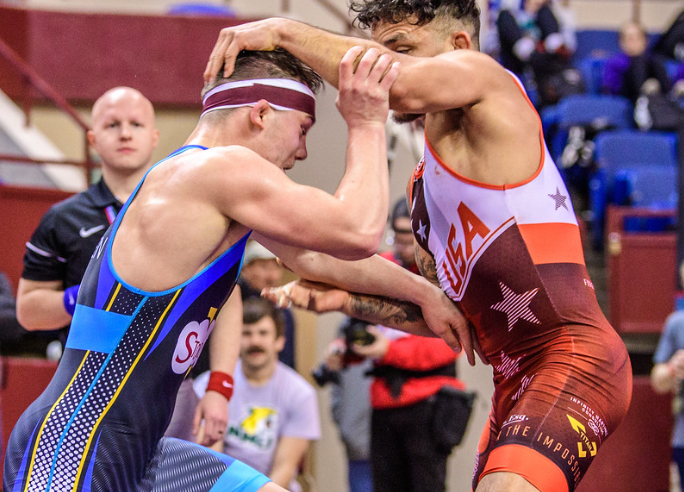
Nielsen (blue) has only had one crack at two-time World Team member Patrick Martinez (NYAC/FLWC) thus far, a 2-1 decision loss in the US Nationals that he would love to do over again. “If I could go back to that match, I would do some things a lot differently,” he says. (Photo: Tony Rotundo)
The objective to qualify was still within reach. Shuffled into the consolation bracket, Nielsen had to nail down one win to assure himself a spot in the Olympic Trials. The opponent was teammate Barrett Stanghill (Minnesota Storm/NTS). A friend and workout partner, they were used to trading paint inside the NMU practice room and had finally clashed in competition the month prior in New York, a 2-1 decision for Nielsen. The winner of their bout in Texas was guaranteed a Trials berth, as placing in the top-5 was the procedural mandate. Whoever lost — or so they thought — would have to fight it out in the 5th-place match where nothing was promised.
But just as tension had begun to mount on the second day of the event, NMU head coach Andy Bisek had some news: Chandler Rogers (TMWC), who became Trials-qualified in November, had defaulted out of the tournament following his semifinal loss to Jon Anderson (Army/WCAP). The result no longer mattered, at least not when it came to stamping down a Trials berth.
“Andy came and found Barrett and I, and he’s the one who told us. He said to go out there and just wrestle, to have fun. It was just going to be a wrestling match,” Nielsen says.
That it was, and not unlike their initial meeting in New York. Nielsen — as is his calling card — snared an appendage, in this case Stanghill’s right arm, popped for an attempt and came around back for a takedown. Stanghill pressured his way to a passivity point in the second period and was unable to convert from par terre. Nielsen had grabbed another 2-1 white-knuckler over his pal, setting the stage for a curtain call in the bronze round.
Pressure was absent. No more boxes needed to be checked. Third place at the National tournament sounded a whole lot better than fourth and it was house money resting on the felt. Former Junior World Team member and ’17 U23 Trials runner-up Rich Carlson, who like Stanghill and Nielsen is also a Storm rep, was having a fine outing. Other than a quarterfinal loss to Martinez, Carlson had looked plenty strong during the event. Similar to stablemate Stanghill stylistically, he is awash with ability and an eager pummeler. Those assets helped Carlson come back in the consolation bracket to collect a pair of tech falls setting the table for what most figured would be a dragged-out battle to decide 87-kilo bronze. But nah.
The horse had already bolted the barn, sprinting towards daylight.
An arm drag led to a takedown and seamless follow-up gut. They returned to the center. A little more than :20 ticked off the clock and Nielsen attacked with an arm spin. It wasn’t there, though he kept the arm and levered to a takedown. He then got his lock and rolled Carlson for two, ending the match along with any questions as to who the story was at 87 kilograms heading into the Christmas break.
Only, that wasn’t the first thought on his mind. Not that Nielsen fails to recognize the refreshing brand of offense for which he was responsible at the Nationals. He certainly does (“I think I scored close to 30 points in the tournament, didn’t I?” he asks rhetorically.). Rather, he was just as pleased that he put in his most potent Senior performance to date in front of loved ones, particularly because it has become an increasingly rare occurrence.
“It was definitely a good ending to the tournament. My family was there, my mom and my girlfriend were there. Not a lot of people come to watch me anymore, so it’s really nice when family is there.”
Once the holidays were acknowledged and January appeared just in time to embrace the hardness of winter, Nielsen jetted to Europe. For the second year in a row, he participated in the US tour of Denmark, a jaunt featuring the annual Thor Masters Invitational and its popular accompanying training camp. He got on an impressive run at Thor, putting himself in the medal chase only to miss out after Norwegian star Zakarias Berg cut the ride short. Hardware or not, it was a strong showing that more proof his standing in the heavier weight was for real.
Three tournaments in at 87 kilograms, one crammed with a slew of tough foreigners, and a good chunk of time to prepare for the Trials altered the scope in which Nielsen was viewed. By fans and fellow athletes. He wasn’t going to be pegged as a favorite. He also wasn’t going to be someone the others looked forward to facing. Whether wearing the third or fourth seed, Nielsen would (or, will) be seen as a hazardous presence in the bracket. Until Joe Rau (TMWC/IRTC) pasted the field in Ottawa no other US 87 had captured as much momentum leading to a Trials, not in recent years. Or as quickly.
And Then…
“It was heartbreaking.”
Nielsen doesn’t lose his rapid-fire rhythm when recounting how he learned the Olympic Trials had been postponed in the wake of the coronavirus pandemic that has shut down much of the world since mid-March. The tonality in his voice drops a little but he is not at a loss for words. He was in Marquette as news filtered in and it didn’t take long for him to piece together the circumstances.
“I think we had gotten done with practice and then found out later that evening that we wouldn’t be practicing the next day,” remembers Nielsen. “At first I was like, This really can’t be that big of a deal. I’m sure it is just because we practice on a college campus but we’re going to be fine. I’ll just go to Storm to practice. Well, Storm was canceled, too.
“So it hit me. I thought, Well if we can’t practice, we’re not going to be the only ones in the country who can’t practice. This tournament is going to be canceled or postponed, or something. I came home just to be home, I guess. I stayed there for a few weeks and that was over the course of when the Trials were supposed to be. That’s when I found out. It sucks.”
And you know, it really does. The United States Greco-Roman program is poised to enter these next Olympic Trials offering its largest collection of genuine young challengers in two quadrenniums. An argument could be made for three.
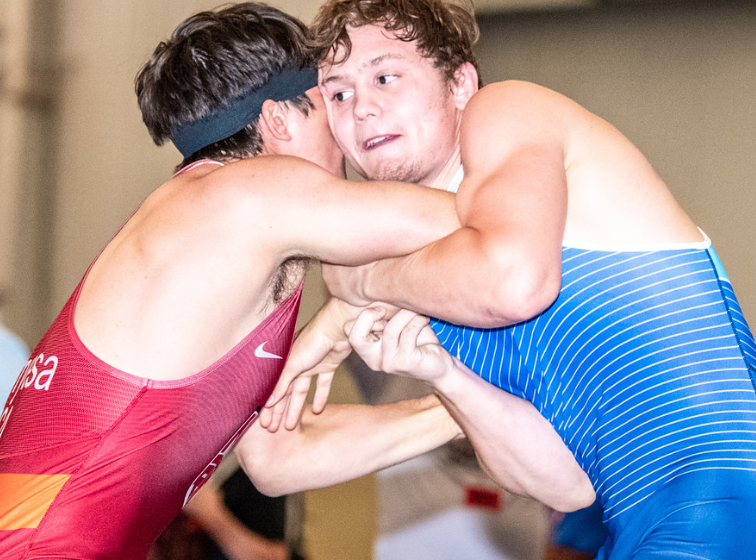
Nielsen and ’18 U23 Trial finals opponent Andrew Berreyesa (red, NYAC/FLWC) started their Senior careers in the same weight class, but have since diverged. Nielsen committed to 87 kg last fall, while Berreyesa is looking to earn a Trials berth at 77. (Photo: Sam Janicki)
Athletes with less than a full Senior cycle under their belts will fill approximately a third of the available bracket spots in most weight categories. Not all are forecast to make lengthy runs, though going by the results from the December Nationals, more turnover than usual wouldn’t exactly send shockwaves. A handful of wrestlers who have yet to make Senior Teams were already considered top contenders for ’20 and Nielsen was one of them. Which is why he needed a minute to reconcile his season’s lofty goal being relegated to the back burner.
“I sacrificed a lot of time and effort. Blood, sweat, tears, all that,” he says, echoing a sentiment expressed by most of his contemporaries recently. Nielsen pauses for a second to arrange his next thought and then continues as if just getting it off of his chest will lead to a catharsis. “I felt that I was wrestling the best I’ve ever wrestled. I had several people in my practice room constantly telling me things like, That’s what we want to see, and, If you wrestle like this you’re really going to make a run at this thing. So, it was a punch in the nuts. A kick, actually.”
Nielsen doesn’t want to end this topic on a down note. Not his style. He would much rather finish with a show of strength and let his answer act as a reminder of why we’re even talking about all of this in the first place. “But I’m staying the course training. I know that whatever was going to happen (for me) at the Trials is still going to happen. Nothing is going to happen differently, that’s the way I look at it.”
Can’t Sit Still
Nielsen is not content to simply manage while wrestling remains tucked away in its temporary slumber. When Marquette went full lockdown in March, he returned to Minnesota to assess, and then re-assess, his options. The degree helps. Nielsen earned a BA in business management from NMU. A proper area of study. Dollar signs dance in front of his eyes. So too does the importance of self-sufficiency. The only reason he is not overcome with bitterness or disappointment due to the Trials’ postponement is because it has brought forth an opportunity to plan for the future. As a wrestler who is not yet in the prime of his career, there are two things of which Nielsen seems most afraid — exiting the sport without accomplishing all of his goals; and exiting the sport without having found a pathway to financial security.
The first item is not entirely under his control. He’ll do his best, and that best might very well be good enough for World and Olympic stardom. The second one, he feels, at least, is completely up to him. Space has opened up and prioritizing finances became attractive the moment he realized that there was going to be extra time on his hands.
So, Nielsen made a plan. And then he hurriedly mobilized his plan. It’s a lot like how he wrestles. He has to keep moving.
“This little break has made it so I can set up my student loan payments, get my own place and a fresh start somewhere. That worked well for me when I got a fresh start at Northern,” says Nielsen. “I am getting myself set up for after wrestling. For the first five or six weeks of the stay-at-home order, I used that time to search out jobs and apply for jobs, and locked down the job I have. It has allowed me to to take the exam to get my real estate license. A lot of guys in this Greco game, there is not a lot they have set up for when they are done wrestling. And then they are done, and it’s, What am I going to do now? This has given me an opportunity to get my foot in the door for what is going to be my career someday and just learn.”
Oh, but there it is. Wait a second. Nielsen senses a nudge. A rabbit hole is looming that both of us would like to avoid. Still, he gets the optics. A wrestler coming off of a breakout holding a chance to make the Olympic Team is detailing his plan for “life after wrestling”? Might not go down too smoothly with some.
He bristles at the suggestion that his devotion to winning could ever come under scrutiny just because he wants to work. To earn money, to have the ability to pay bills sans stress headaches. No one is going to heroically swoop in and cover all of his life expenses, and certainly not after he retires. Moreover — and he is correct in pointing it out — Nielsen does require a consistent income in order to travel and train domestically and abroad. Where is that money going to come from? Currently, his own initiative to join the workforce.
“I think it proves you want it that much more, if you’re willing to go out and financially support yourself like any other normal person in this country,” snaps Nielsen, a tinge of defiance in his voice. “Support yourself — and then on top of that go be an Olympic-level athlete. It takes just as much sacrifice, if not more, then what your body and mind can take in a 40-hour work week. I’m focused on wrestling, but for right now I am equally focused on getting work experience and getting my finances together. That way if I want to go on a trip (overseas), then I can go on that trip because then I’ll have money. ”
Sensing the Continuation
Minnesota has begun to reopen. People are not yet going about their lives as normal but hope is hanging in the air like scattered clouds beneath the warm spring sun. Nielsen doesn’t know for sure when Storm practices will resume, or what they will look like. So he is interested to hear from Patrick Smith (77 kg) or Calvin Germinaro (67 kg) and looking forward to reporting for duty once the phone rings.
Nielsen wants to hone his craft. He wants practices. It has been a while. He is also not worried about rushing back. The job stuff has diverted his attention, true. But that’s not wholly why he is okay with the stalemate. He has discovered something important about balance, something that failed to compute back when he was younger: time off is a good thing. Be it compelled due to injury, school, an out-of-nowhere pandemic — or just plain old burnout — Nielsen doesn’t mind having to stay out of the wrestling room because whenever there has been a hiatus, he comes back feeling renewed.
He offers his recent history for closer inspection. Prior to transferring to NMU from NDSU, Nielsen thought he had gotten his fill of the sport only to land in Marquette ready to embrace a new competitive mission. Then a torn-up knee caught him by surprise the proceeding winter — and soon after he fully recovered, Nielsen won the U23 Trials. Give him a breather, and what you get back in return is a rejuvenated spirit.
“I haven’t wrestled with anyone since the day we found out Northern was closed. I don’t think that’s a bad thing,” Nielsen emphasizes. “After I got hurt last year at the (’19) Open in Vegas, I didn’t touch a mat again until late July. I had a significant amount of time away last season, and as you saw this year, it couldn’t have been too detrimental for me. This time off now has given my body time to heal up. Even though I was healthy going into Trials, you always have little nagging injuries.”
As the discussion winds down and veers fully back towards wrestling mode his delivery becomes more deliberate. The last thing he wants is to give off the wrong impression. Nielsen realizes the story is supposed to be about how, in a flash, he rose up the ranks in a highly-competitive weight class during the most important time in the Olympic cycle only to be told to wait it out a little longer. If anything, this has had to do with timing, a product of the unprecedented circumstances with which he and many others have been forced to reconcile. That Nielsen prefers to use it to his advantage in another way besides fabricating fleeting quarantine workouts that have become all the rage shouldn’t alter anyone’s perception of his resolve.
“Am I staying in shape? Yeah. Am I working out? Yeah. But if I was doing everything the same exact way during lockdown that I was doing beforehand without a chance to compete, I wouldn’t be in the same mindset for when I hop back into it. That’s what this little break has done. I’m going to be extremely motivated.”
Listen to “5PM37: The wildman Sammy Jones” on Spreaker.
SUBSCRIBE TO THE FIVE POINT MOVE PODCAST
iTunes | Stitcher | Spreaker | Google Play Music




